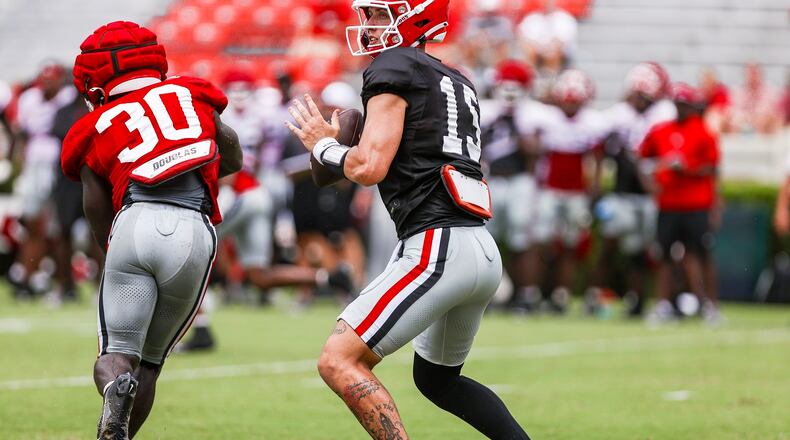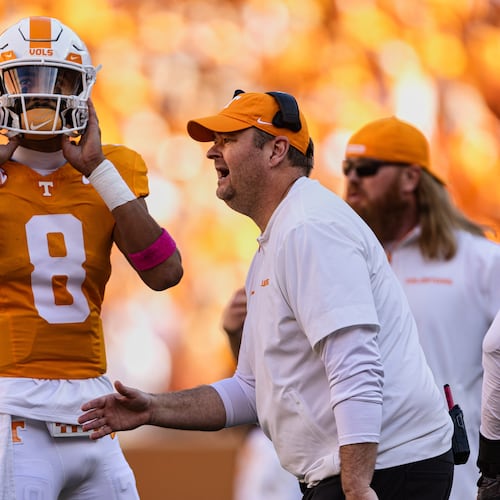ATHENS – Georgia currently holds the past two national championship trophies. Yet, there is somewhat of rebuilding feel to the Bulldogs as they prepare to lift the curtain on the 2023 season Saturday.
First, there is actual rebuilding taking place. Construction crews were scrambling this week to put the finishing touches on the first phase of a $68.5 million renovation of the south side of 94-year-old Sanford Stadium. Second, the Bulldogs are breaking in a new quarterback, not to mention new running backs, new tackles and a new offensive coordinator, though he’s an old one. There will even be a new mascot patrolling the sidelines.
That’s a lot of newness.
Yet, there Georgia remains atop every conceivable preseason poll and carrying the shortest odds in Las Vegas for capturing another national championship. As has been well documented, a third title in a row would be unprecedented in modern college football. Hasn’t been done since Minnesota in 1934-36.
That’s some truly heady stuff there. But for fans, there seems to be almost a collective yawn hanging over Tanyard Creek Valley, where Georgia has played football for well over 100 years. That might have something to do with the Bulldogs’ FCS opponent, Tennessee-Martin, and a September schedule that doesn’t yet offer a Top 25 opponent. But don’t bother mentioning that to Georgia’s coach.
“We’re excited,” said Kirby Smart, who is entering his eighth season at the helm of the Bulldogs’ program. “It’s the first time we’ve been home in quite a long time to open a season. Like everybody this time of year, it’s exciting to kind of judge your team and see who your team is and find out where you are and how these guys will respond to playing. We’re also excited we’ve got a night game as well.”
Indeed, the 6 p.m. kickoff (SEC Network+) represents a rare opportunity for the Bulldogs to truly “light up Sanford” in the fourth quarter against a darkened northeast Georgia sky. Georgia has had very few true night kickoffs since the monumental 8 p.m. game against Notre Dame in 2019.
As it is, UGA had to scramble to have the place ready this year. As late as Friday, they were putting the finishing touches on the first phase of massive south-side renovation. Since Sanford Stadium was built in 1929, the lower concourses on that side have remained 9 feet wide, with spartan concession stands and outdated restrooms dotting the length. Those same halls are now 21 feet wide, with the new walls covered with brightly covered graphics. Expansive service plazas have been constructed at either end. The southwest corner features one new women’s restroom that includes 75 stalls. That might be a record, UGA officials claim.
A potential downside for longtime attendees is the lost access to Gillis Bridge. Long an unfettered north-south footpath for the public on game days and an excellent perch from which to observe Georgia’s famous “Dawg Walk” through the lower Tate Center parking lot, the bridge has been incorporated into the stadium’s footprint. That means from 7 p.m. Friday night until an hour or so after games, the bridge is accessible only to ticketed spectators two hours before kickoff. Gates 1 and 9 now will be stationed at either end as primary entry and exit points.
The upside, UGA contends, is much greater freedom of movement and access within the stadium. In the meantime, the Silver Dawgs, the straw-hat-wearing alumni group that serves as game-day hosts, will be hustling Saturday to direct fans through the new maze to their seats. UGA believes the changes were needed desperately and eventually will be appreciated thoroughly.
“It’s the most significant change since probably the opening of the stadium,” said Tanner Stines, Georgia’s associate athletic director for facility operations and capital projects. “That Gate 9 area, which is a major flow are for most of the people in the south-side lower bowl, that has really taken on a new life. It’s twice the size it was before. I think most people will have a much better game-day experience because of it.”
Of course, it’s what happens on the field that is of the greatest concern to Georgia fans. That’s even more magnified in the year of a quarterback change. Carson Beck, a 6-foot-4, 220-pound junior from Jacksonville, Florida, succeeds Stetson Bennett, Georgia’s quarterback of record the past three seasons.
Beck served as the Bulldogs’ primary backup quarterback for the past two seasons. Saturday versus Tennessee-Martin represents the first game he has started since November 2019, when Mandarin lost to Seminole County in the first round of the Florida high school playoffs.
“Obviously, it means a lot,” Beck said of beating out sophomore Brock Vandagriff and freshman Gunner Stockton in the preseason competition. “I’ve put in a lot of time, work, effort. I’ve been grinding the past four years, and to finally see that come into fruition and pay off, it’s a really exciting time.”
Typically, things don’t go as well in the season following a long quarterback tenure. Since they went to 12-game regular seasons in the early 1990s, the Bulldogs have recorded an average of 8.4 wins and 3.7 losses in the season following the departure of a starting quarterback of at least three seasons. This season represents the eighth such transition, dating to Eric Zeier graduating in 1994 and Mike Bobo taking over in 1995.
Bobo broke his leg, the Bulldogs went 6-6 and coach Ray Goff was fired that season. But there have been years when the transition went swimmingly. D.J. Shockley succeeded David Greene in 2005 and led the Georgia to the SEC championship.
Now Bobo is back. He returns to the coaches’ booth as Georgia’s offensive coordinator for the first time since he left Athens to become Colorado State’s head coach after the 2014 season. That last season with the Bulldogs remains the school’s highest-scoring on record (41.3 ppg). Georgia averaged 41.1 points on the way to recording a 15-0 record a season ago.
“I met my wife here. My kids were born here,” Bobo said of returning to work for his best buddy, Smart, at his alma mater. “You’re at a place working for an administration that believes in what we’re doing, and our head coach has a plan how to do things. To be part of this program that I played at, went to school, graduated from the University of Georgia, I couldn’t pass that opportunity up.”
On defense, eight starters are back from a unit that gave up only 14.3 points per game last season. Twelve players on defense have started before. Four linemen return who have a combined 154 games of college football experience. Defense, again, will rule the day.
Accordingly, there’s not a lot of trepidation accompanying the Bulldogs into the season opener. That’s compounded by hosting a paid sacrificial opponent from a lower division, but confidence is high besides. Georgia has won 29 of its past 30 games. With a victory Saturday, it will establish the longest win streak in school history, at 18 games. Their last loss was to Alabama in the 2021 SEC Championship game, and the Bulldogs avenged that a month later with a win that secured their first national championship victory in 41 years.
There have been great losses since, but they all have been of the heartbreaking, circle-of-life variety. Sonny Seiler, the founding father of Georgia’s Uga mascot tradition, died Monday at the age of 90. It happened in the same week that “Boom,” the latest in the Seilers’ line of white English bulldogs, will don his mascot jersey officially as Uga XI for the first time.
Junior guard Devin Willock and recruiting staffer Chandler LeCroy, killed in a January car crash, also are expected to be recognized and honored in some way Saturday. Tears will be shed.
So, much is going on. Soon the focus will be fully trained on the Bulldogs’ pursuit of the elusive three-peat in college football. But with the schedule and circumstances set as they are, it will be more about what’s new and different for the Bulldogs than what they eventually might be.
“I just don’t think you can make it about that,” Smart said of focusing on making history. “The minute you do that, you open yourself to distractions and added pressure. What if it doesn’t happen? What are you playing for? … This is just about UT-Martin and us.”
For now, that’s enough.
About the Author
Keep Reading
The Latest
Featured



